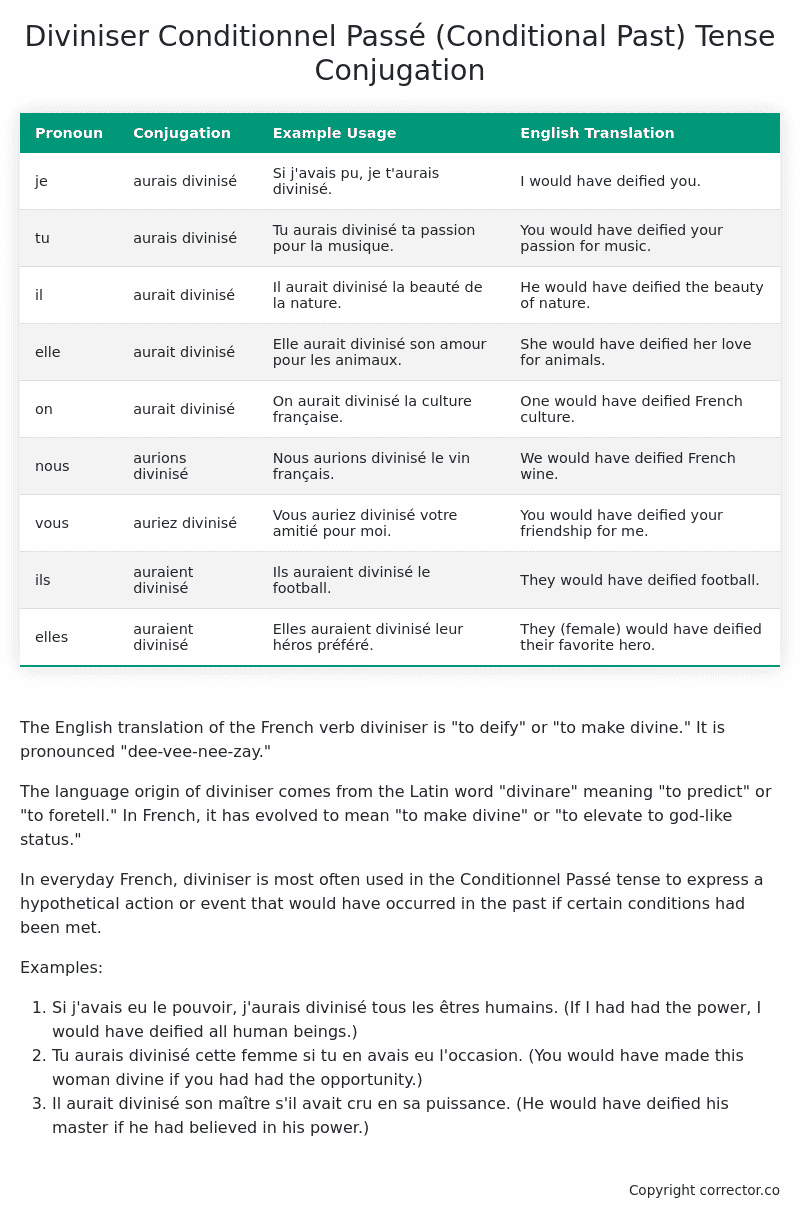Conditionnel Passé (Conditional Past) Tense Conjugation of the French Verb diviniser
Introduction to the verb diviniser
The English translation of the French verb diviniser is “to deify” or “to make divine.” It is pronounced “dee-vee-nee-zay.”
The language origin of diviniser comes from the Latin word “divinare” meaning “to predict” or “to foretell.” In French, it has evolved to mean “to make divine” or “to elevate to god-like status.”
In everyday French, diviniser is most often used in the Conditionnel Passé tense to express a hypothetical action or event that would have occurred in the past if certain conditions had been met.
Examples:
- Si j’avais eu le pouvoir, j’aurais divinisé tous les êtres humains. (If I had had the power, I would have deified all human beings.)
- Tu aurais divinisé cette femme si tu en avais eu l’occasion. (You would have made this woman divine if you had had the opportunity.)
- Il aurait divinisé son maître s’il avait cru en sa puissance. (He would have deified his master if he had believed in his power.)
Table of the Conditionnel Passé (Conditional Past) Tense Conjugation of diviniser
| Pronoun | Conjugation | Example Usage | English Translation |
|---|---|---|---|
| je | aurais divinisé | Si j’avais pu, je t’aurais divinisé. | I would have deified you. |
| tu | aurais divinisé | Tu aurais divinisé ta passion pour la musique. | You would have deified your passion for music. |
| il | aurait divinisé | Il aurait divinisé la beauté de la nature. | He would have deified the beauty of nature. |
| elle | aurait divinisé | Elle aurait divinisé son amour pour les animaux. | She would have deified her love for animals. |
| on | aurait divinisé | On aurait divinisé la culture française. | One would have deified French culture. |
| nous | aurions divinisé | Nous aurions divinisé le vin français. | We would have deified French wine. |
| vous | auriez divinisé | Vous auriez divinisé votre amitié pour moi. | You would have deified your friendship for me. |
| ils | auraient divinisé | Ils auraient divinisé le football. | They would have deified football. |
| elles | auraient divinisé | Elles auraient divinisé leur héros préféré. | They (female) would have deified their favorite hero. |
Other Conjugations for Diviniser.
Le Present (Present Tense) Conjugation of the French Verb diviniser
Imparfait (Imperfect) Tense Conjugation of the French Verb diviniser
Passé Simple (Simple Past) Tense Conjugation of the French Verb diviniser
Passé Composé (Present Perfect) Tense Conjugation of the French Verb diviniser
Futur Simple (Simple Future) Tense Conjugation of the French Verb diviniser
Futur Proche (Near Future) Tense Conjugation of the French Verb diviniser
Plus-que-parfait (Pluperfect) Tense Conjugation of the French Verb diviniser
Passé Antérieur (Past Anterior) Tense Conjugation of the French Verb diviniser
Futur Antérieur (Future Anterior) Tense Conjugation of the French Verb diviniser
Subjonctif Présent (Subjunctive Present) Tense Conjugation of the French Verb diviniser
Subjonctif Passé (Subjunctive Past) Tense Conjugation of the French Verb diviniser
Subjonctif Imparfait (Subjunctive Imperfect) Tense Conjugation of the French Verb diviniser
Subjonctif Plus-que-parfait (Subjunctive Pluperfect) Tense Conjugation of the French Verb diviniser
Conditionnel Présent (Conditional Present) Tense Conjugation of the French Verb diviniser
Conditionnel Passé (Conditional Past) Tense Conjugation of the French Verb diviniser (this article)
L’impératif Présent (Imperative Present) Tense Conjugation of the French Verb diviniser
L’infinitif Présent (Infinitive Present) Tense Conjugation of the French Verb diviniser
Struggling with French verbs or the language in general? Why not use our free French Grammar Checker – no registration required!
Get a FREE Download Study Sheet of this Conjugation 🔥
Simply right click the image below, click “save image” and get your free reference for the diviniser Conditionnel Passé tense conjugation!

Diviniser – About the French Conditionnel Passé (Conditional Past) Tense
Formation
Common Everyday Usage Patterns
Expressing Unreal Past Scenarios
Polite Requests or Suggestions
Expressing Doubt or Uncertainty
Interactions with Other Tenses
Conditional Present
Indicative Past Tenses
Conditional Future
Summary
Want More?
I hope you enjoyed this article on the verb diviniser. Still in a learning mood? Check out another TOTALLY random French verb conjugation!


